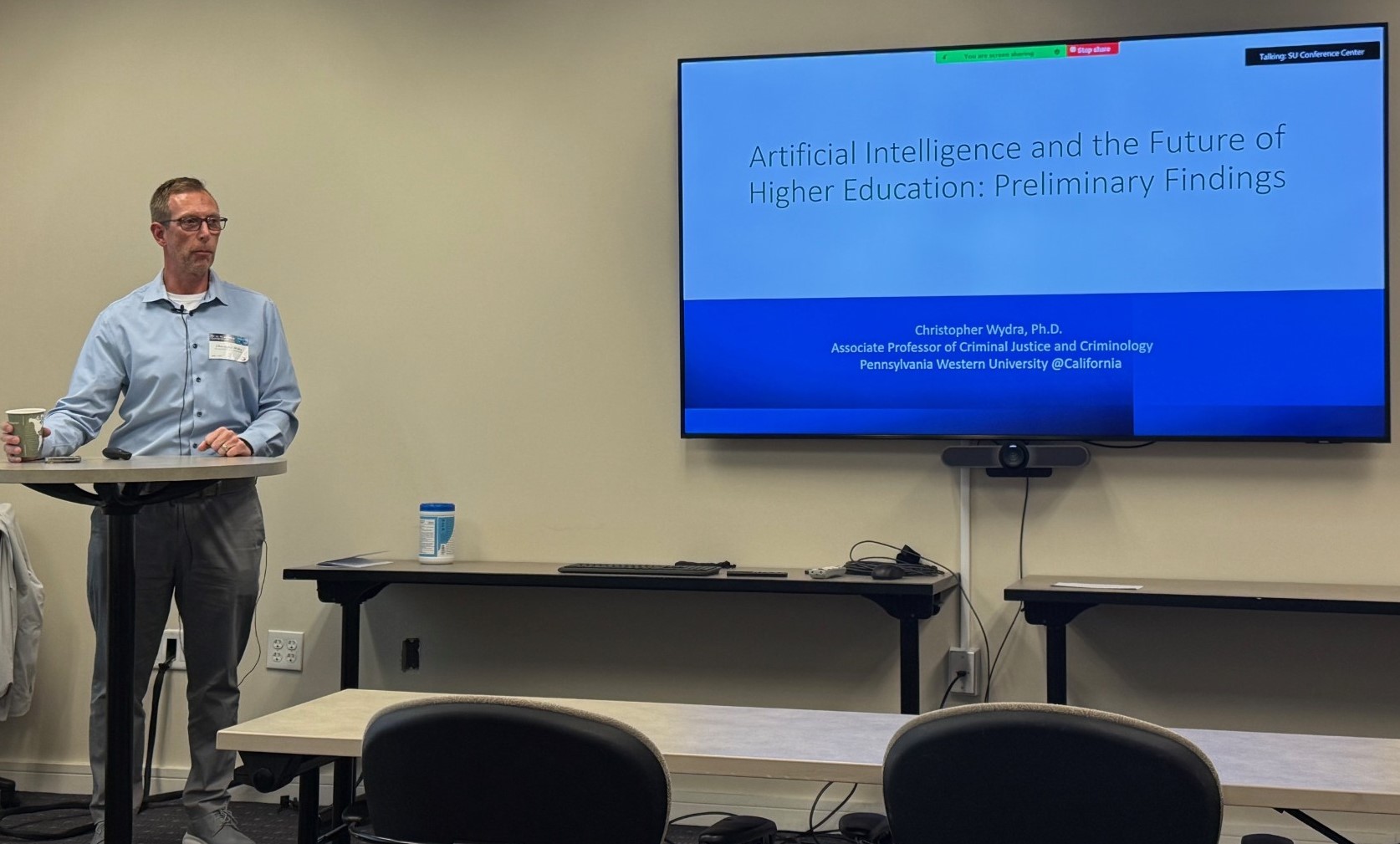- Dr. Pratibha Menon
- Dr. Joe Schwerha
- Dr. Everett Painter
- Dr. Christopher Wydra
- Jennifer Williams
- Dr. Angela Milliren
- Dr. Jessica Harris
- Dr. Ryan L. Sittler
- Dr. Lacey Fulton
- Dr. Brian Fuller
Faculty and staff from PennWest University took center stage at the annual Shippensburg AI in Higher Education Conference, where they led discussions and shared cutting-edge insights on the transformative role of artificial intelligence (AI) in academia.
Representing a diverse range of disciplines and campuses, the PennWest team included:
Their presentations spanned a wide array of topics—from AI ethics and policy to creative applications like custom chatbots and digital media production—highlighting AI’s impact across the educational spectrum, from kindergarten through doctoral studies.
“These powerful presentations from PennWest faculty and staff demonstrate the impact of interdisciplinary collaboration on advancing ethical, equitable, and innovative uses of AI in education,” said Dr. Camille Dempsey, director of the PennWest Center for Artificial Intelligence and Emerging Technologies.
“We’re proud to lead the way in designing a future of learning empowered by AI — for everyone.”
Opening Keynote: A Vision for AI in Education
The day kicked off with a keynote titled “Advancing Education with AI: Innovations and Insights from the PennWest Center for AI and Emerging Technologies”, delivered by Dempsey. Her address underscored PennWest’s commitment to integrating AI in ethical, inclusive, and future-focused ways across teaching, learning, and leadership.
Featured Sessions
“The Elephant in the Room: Is AI Antithetical to Higher Ed?”
Dr. Ryan Sittler, Dr. Everett Painter, Dr. Christopher Wydra
This engaging panel explored whether AI challenges core educational values like academic
integrity and student-faculty relationships. Through open dialogue and collaborative
discussion, attendees gained tools for designing responsible AI policies and incorporating
AI into course design and assessments.
“AI Horizons in Academia: Navigating Innovations, Ethics, and Pedagogy”
Dr. Pratibha Menon, Jennifer Williams, Dr. Camille Dempsey
This session focused on AI as a force for transformative change in education. Panelists
shared strategies for integrating ethical AI use into curriculum and culture, addressing
concerns like bias, privacy, and faculty readiness.
“Navigating the Future: AI Law, Policy, and Ethics in a Transformative Era”
Dr. Camille Dempsey, Dr. Joe Schwerha
Real-world case studies and scenario-based discussions helped participants understand
evolving regulations and develop sustainable AI governance strategies.
“Chatbot Creations: AI-Powered Custom GPTs in Academia and Beyond”
Dr. Pratibha Menon, Dr. Angela Milliren, Dr. Camille Dempsey, with contributions from
Dr. Lacey Fulton
This hands-on session introduced the use of custom GPT chatbots for personalized learning,
content creation, and student engagement. Presenters offered practical guidance on
developing and evaluating AI tools for instructional use.
“AI for Scriptwriters and Creative Ideation”
Dr. Brian Fuller
A look into how AI tools like ChatGPT are supporting creativity in digital filmmaking
and media production, bridging technology and the arts in new and innovative ways.
“Artificial Intelligence and the Future of Higher Education”
Dr. Christopher Wydra
Based on early research findings, this session explored faculty and student perspectives
on AI adoption. It examined key factors influencing acceptance and the challenges
institutions face in implementing AI.
“From Kindergarten to Doctorate: The Evolution of AI in Education”
Dr. Angela Milliren, Dr. Jessica Harris, with contributions from Dr. Lacey Fulton
This comprehensive session traced AI’s influence across all educational stages, from
early childhood to doctoral studies. Presenters emphasized strategies for promoting
digital literacy, supporting transitions, and enhancing advanced research.
